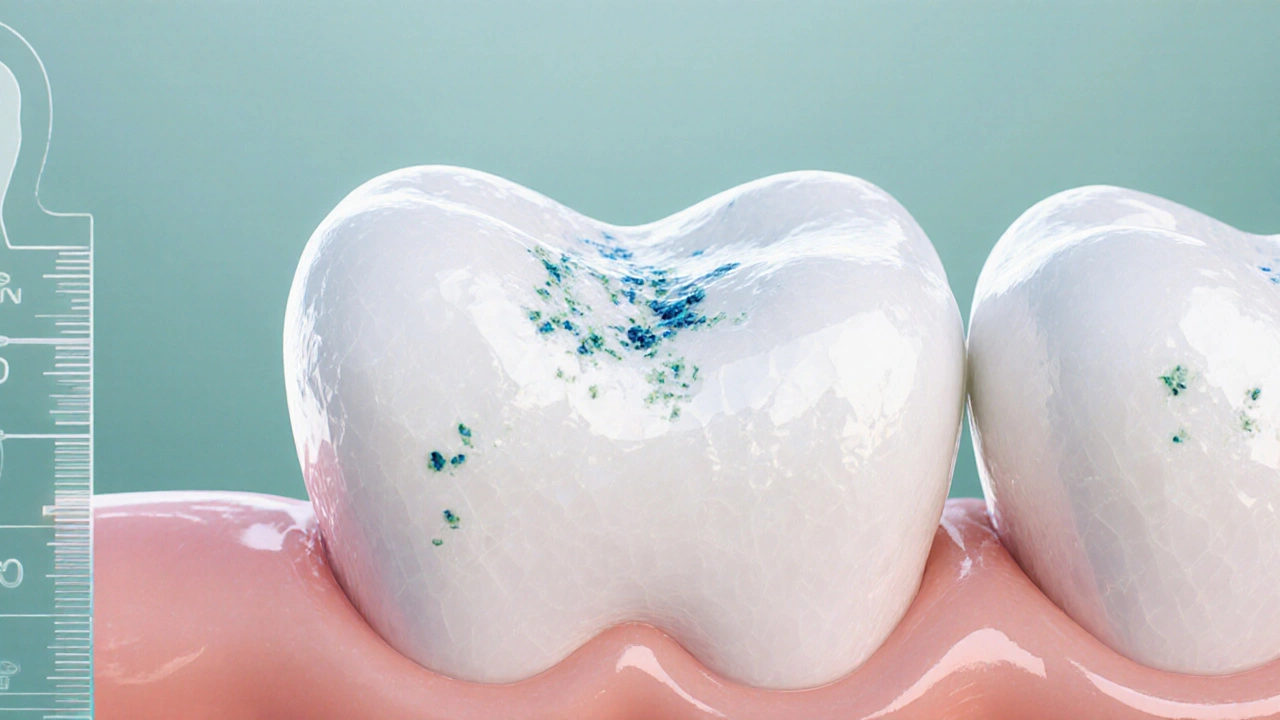Vápník – základ zdravých zubů a pevných dásní
When talking about vápník, minerál, který tvoří většinu zubní skloviny a kostí. Also known as calcium, it plays a decisive role in dental health by strengthening enamel and supporting bone structure of the jaws. Without enough vápník, your teeth become vulnerable to decay and sensitivity.
Another key player is zuby, tvrdé struktury tvořené sklovinou, dentinem a kořenem. They rely on a balanced supply of minerals, especially calcium and phosphorus, to maintain their integrity. The process called remineralizace constantly repairs tiny defects in enamel, and calcium is the main ingredient in this natural repair kit.
To understand why calcium matters, think of enamel as a brick wall. Each brick is a hydroxyapatite crystal, which is essentially calcium phosphate. When you eat sugary foods, acids dissolve these crystals – that's demineralizace. If you then provide enough calcium (and fluoride), the wall gets rebuilt, a process described by the semantic triple: "vápník podporuje remineralizaci zubní skloviny". In other words, more calcium = stronger repair.
Jak získat dostatek vápníku z výživy
Everyday diet is the most reliable source of calcium. Dairy products like milk, yoghurt, and cheese are classic, but leafy greens (broccoli, kale), nuts (almonds), and fish with soft bones (sardines) also pack a punch. The entity výživa, celkový příjem živin, který ovlivňuje zdraví těla i úst determines how much calcium reaches your bloodstream and eventually your teeth.
But quantity isn’t the only factor – absorption matters. Vitamin D is essential for calcium uptake, creating another semantic link: "vitamin D zvyšuje vstřebávání vápníku". Without sufficient vitamin D, even a calcium‑rich diet won’t translate into stronger enamel. Sun exposure and fortified foods help keep this balance.
For readers who wonder whether supplements are needed, the rule of thumb is to aim for the recommended daily allowance (RDA) – 1000 mg for adults. If you struggle to meet it through food, a calcium supplement can fill the gap, but always combine it with vitamin D and avoid high doses of iron, which compete for absorption.
Now, let’s talk about the connection between calcium and ústní hygiena, každodenní péče o zuby a dásně. Brushing twice a day, flossing, and using mouthwash reduce plaque, which is the main source of acids that leach calcium from enamel. This creates a clear triple: "úspěšná ústní hygiena snižuje ztrátu vápníku". In practice, good hygiene creates a less acidic environment, allowing calcium to stay where it belongs.
Many of our articles dive deeper into these topics. For example, the guide on "Zubní plak a zdraví dásní" explains how plaque formation leads to demineralizaci, while the post about "Jak zastavit počínající zubní kaz" offers practical steps to boost remineralizaci with calcium‑rich toothpaste and fluoride.
Another angle is the role of calcium in preventing periodontal disease. Healthy gums need firm connective tissue anchored to bone, and calcium is a major component of that bone. The semantic relationship here reads: "vápník posiluje kostní strukturu čelistí, což chrání dásně před ztrátou“.
When you’re dealing with specific dental procedures, calcium still matters. After a professional cleaning (scaling), the exposed surfaces are more vulnerable to acid attack. Applying fluoride or calcium‑based remineralization gels can accelerate healing—a tip covered in our article about post‑cleaning care.
For those wondering about the timing of calcium intake relative to meals, research shows that spreading calcium throughout the day improves absorption. Pairing calcium‑rich foods with vitamin D sources (like eggs or oily fish) maximizes the benefit, while avoiding excess caffeine or high‑phosphorus drinks that can hinder uptake.
If you’re an athlete or have high physical demands, you might lose calcium through sweat. In such cases, monitor your intake and consider fortified sports drinks or supplements to keep your dental base strong.
Our collection also touches on common myths. For instance, the belief that “hard water protects teeth” is only partly true; while it adds minerals, it can also increase enamel erosion if the water is acidic. Balanced diet remains the cornerstone.
Finally, the synergy between calcium and fluoride is worth mentioning. Fluoride incorporates into the enamel lattice, creating fluorapatite, which is even more resistant to acid. Together, they form a powerful defense, a relationship captured by the triple: "fluorid a vápník spolu zvyšují odolnost zubu proti kazu".
Whether you’re looking for everyday tips, dietary recommendations, or guidance after a dental procedure, the information below will help you harness the power of calcium for a brighter, healthier smile. Dive into the articles for practical advice, step‑by‑step guides, and the latest insights from dental experts.
Ready to explore? Below you’ll find a curated list of posts that cover everything from plaque control to remineralization techniques, all tied together by the central role of calcium in oral health.

Jak podpořit zdravou zubní sklovinu: tipy, potraviny a produkty
Zjistěte, jak podpořit zdravou zubní sklovinu: správná výživa, fluorid, vitamín D a tipy na každodenní ústní péči.
října 13 2025